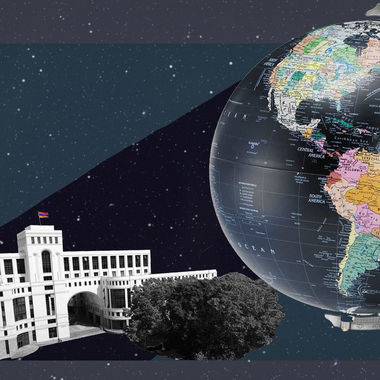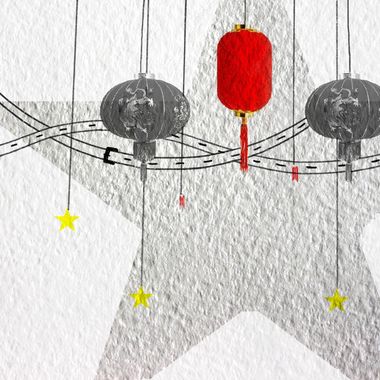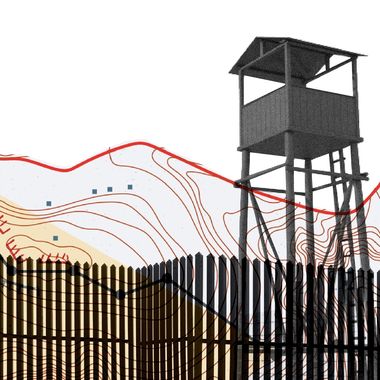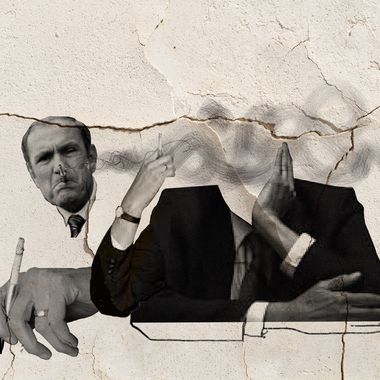
Illustration by Armine Shahbazyan.
What has Armenia’s defeat in the 2020 Artsakh War revealed? In order to diagnose a number of misconceptions, failures and dysfunctions that exist in Armenia’s statehood and society, three scholars recently published a White Paper entitled, “The Karabakh War of 2020 and Armenia’s Future Foreign and Security Policies”.
Taline Papazian (a French-Armenian political scientist), Robert Aydabirian (a French-Armenian executive and analyst) and Jirair Libaridian, (a retired Armenian-American historian and diplomat) have all been intimately, and in different ways, involved in the life of Armenia and Artsakh in recent decades. The result of intergenerational and pan-Armenian collaboration, their work sets the stage for a fundamental debate that is essential for the recovery of the Armenian state.
The collective work of Papazian, Aydabirian and Libaridian makes it possible to give an account of the reasons for the defeat of 2020 and to draw the necessary conclusions for a collective start. In the months following the disastrous 44-day war, the authors conducted in-depth surveys with 70 respondents from various professions and disciplines in Armenia, Artsakh and the diaspora. The respondents are both representative of the “old” and the “new” diaspora; some have held and continue to hold positions of responsibility in Armenia and Artsakh. Others are academics, officials, philanthropists, former diplomats and veterans. They all share a concern for the future of the Armenian nation and state. The results of this survey led the authors to make recommendations and conclusions that reflect several points of view.
One must acknowledge divergent points of view to offer a credible explanation of how we arrived at this point, and present a clear and concise description of the state of current thinking on the Nagorno-Karabakh conflict, including proposals on how to proceed from here. It is also necessary to offer a glimpse of potential developments and likely outcomes.
Divided into two main parts, the White Paper first summarizes the views of respondents about the war and the reasons for the defeat; future options for foreign policy; and also factors that must be taken into account. The second part presents the observations of the three authors on the challenges facing Armenia in its regional and international environment, and makes some recommendations around the immediate concerns, starting with the urgent need to develop a proactive foreign policy and ensure the defense of the country. Obviously, this report only gives a snapshot of the situation, a wide range of ideas and positions at a precise moment, in an ever-changing political context.
The most interesting part of the document is the recommendations at the end. The authors had the good presence of mind to take up some key points from the thoughts of Rouben Shougarian, a great Armenian diplomat and thinker, who died in 2020, a few months before the outbreak of the war. The other strong point of this White Paper is the detailed argument for the necessary reform of the Armenian Armed Forces and of the security architecture. In this, it may constitute an embryo of a defense doctrine, even a chapter in a book on Armenian strategic thought worthy of the name and still to be written.
Regarding foreign policy, various options are on the table, including the highly questionable option of armed neutrality, inspired by the Swiss or Austrian model. But one thing is certain, time is not on Armenia’s side.
The Shadow of Levon Ter-Petrosyan
The authors worked without ulterior motives or precise schedules. They did so with rigor and legitimacy so as to be subtle enough to distinguish between opinion and analysis, reflection and emotion. Their openness, as well as their honesty and intellectual integrity, should be welcomed.
Playing on semantics, the authors insist that the Armenian leaders made a mistake by confusing diplomacy and lobbying. Between the lines, we find the influence of the political thought of Levon Ter-Petrosyan, the first President of the Republic of Armenia, with whom Jirair Libaridian worked from 1991 to 1997. We can read between the lines that the authors do not believe in a "nationalist ideology” (azkayin kaghaparakhosutyun), convinced that the Armenian people have been sufficiently fed up with false hopes and chimerical illusions.
Like Rouben Shougarian and Levon Ter-Petrosyan, the authors call for a balance, not to confuse the Armenian national (azkayin) interest with that of the state (petutyun). Confusing these two agendas weakened Armenian diplomacy, making it inaudible. Though they do not say it overtly, one can easily deduce that Armenia has overemphasized the international recognition of the genocide instead of investing in a political settlement of the Nagorno-Karabakh conflict. They are also convinced of the need to open a direct and discreet line of communication with Turkey, but also with Azerbaijan, a kind of hotline which is already available between the Turks and the Greeks. Looking to the future, they propose a redefinition of the Armenian concept of defense and the purpose of its armed forces. The security architecture is a matter of military doctrine but also of strategic alliances. To better understand and assess the threats, one needs to re-imagine the role of the Armenian Ministry of Foreign Affairs. Last but not least, there are diaspora experts in the fields of cybersecurity of information security who can bring their skills to the strengthening and reform of the Armenian state. How can we explain official Yerevan’s lack of interest in their talents?
A Catalog of Good Intentions
The authors acknowledge the extreme vulnerability of Artsakh, which, without the Russian presence, would be wiped off the map altogether. They seem to have endorsed the loss of Armenian sovereignty over this territory which is shrinking like a skin of sorrow.
Realistically, the authors do not believe in the independence and international recognition of the enclave. We must save what is still possible. A catalog of good intentions on what Armenia's role should be in helping the Armenians in Karabakh, but also encouraging executives in the diaspora to take their share of responsibility.
How can we guarantee the rights of the people of Artsakh, "guarantee" their security through only diplomatic channels? The authors say the new Armenian government should take a two-pronged approach: (a) open direct channels of communication with Baku and Ankara, in addition to Moscow, and facilitate the opening of economic ties in the region while engaging in other matters of mutual interest; and (b) pursue this policy on the international scene, in particular through the OSCE Minsk Group. However, nothing is said about the evolution of the balance of power, nor of how Armenia can adopt an agenda compatible with Russian interests without losing what little sovereignty it has left.
Regarding Armenia, they believe it necessary to develop proactive diplomacy using direct channels of bilateral discussions with all the states concerned, with a focus on Azerbaijan, which was the case during the first war, but also Georgia, Turkey, Iran and Russia, as well as various member states of the CSTO, bilaterally. “Armenia should work with the Azerbaijani and Turkish governments to move from a rhetoric of humiliation and subordination toward one of respectful coexistence. In practice, those governments must emphasize the tasks at hand over institutionalized Armenophobia,” they write. This is wishful thinking, which fails to mention the dire mistakes of Armenia under the administration of second President Robert Kocharyan, who considered the Karabakh problem already solved and regarded the seven districts surrounding the former Nagorno-Karabakh Autonomous Oblast as "liberated" territories.
On the other hand, the point which underlines the need to improve the preparation and performance of Armenian diplomats, as well as relations with the diaspora, is very relevant. The (provisional) conclusions of this report invite us to establish the correct diagnosis, to identify the ailments that plague Armenian society and the Armenian state, in order to work toward a remedy. In the months to come, Armenia will have to make crucial decisions about what kind of future it wants to build, and on what basis, including young minds with the foresight and imagination to visualize it. The Armenia of the future must rebuild its economy, social cohesion, public institutions, education and health systems, as well as a modern defense system. In defining its new foreign and security policies, Armenia must also understand that it is facing a new regional and international situation.
"The defeat has engendered a crisis of sovereignty, real and psychological. Every time Armenians face an existential crisis, the eternal dilemma raises its head: The need for saving ourselves vs. achieving sovereignty. Is it possible to break the vicious cycle? Are those the only choices, or are those choices as stark as they appear? Can well thought out foreign and security policies become instruments to break that vicious cycle?” they sum up. Armenia as a State and as a Nation is going through an extremely serious political and psychological crisis, fueled by a loss of confidence in all the values which used to serve as the basis for the representation that the Armenian people had of reality. The security versus sovereignty dilemma is always more acute.
The authors took note of the deep fault lines that divide the Armenian elites in responding to the causes and consequences of the war. But for their document to be a success, it is still necessary that quality debates be held wherever possible. For this, the authors invite the Armenian government, researchers and interested experts to deepen and develop each topic addressed. They do not shirk bad political and diplomatic choices, nor the responsibilities of successive governments. Following this logic, the best service we can render them is to present, in realistic and pragmatic terms, an overview of the situation and the few options that present themselves. And to hope that they will meet some attentive ears.
Also read
Why Is Armenia Terrible at Foreign Policy? The Failure of Multi-Vectorism and the Need for a New Doctrine
By Nerses Kopalyan
Armenia’s defeat in the 2020 Artsakh War was a collective failure of all state bodies and institutions. The new Armenian government must construct a foreign policy doctrine defined by “strategic engagement.”
What Is France Looking for in the Nagorno-Karabakh Issue?
By Gaïdz Minassian
Since the 2020 Artsakh War, France has been at the forefront of diplomatic activity in resolving the Nagorno-Karabakh conflict. What goal is Paris hoping to achieve with this issue that is so far removed from the concerns of the French?
Was China All Innocent During the 2020 Artsakh War?
By Paruyr Abrahamyan
China considers Turkey a key strategic partner under the Belt and Road Initiative. It has also intensified economic relations with Azerbaijan and is keen to diversify its commercial routes to Europe. Was China a silent observer or did it have any role to play during the 2020 Artsakh War.
CSTO Failing At Its One Job
By Areg Petrosyan
Armenia will be looking to take advantage of its chairmanship of the CSTO to create a new Crisis Response Center. If its supposed allies continue their indifference even at the organizational stage, they should all be asking themselves why they are together in the first place.
Armenia’s New Security Architecture: Russia as Geopolitical Bodyguard
By Nerses Kopalyan
Armenia needs to reconfigure the political economy of its security architecture by utilizing its security alliance with Russia, through a mechanism of burden-sharing, where Russia’s geopolitical interests are aligned with Armenia’s security interests.
The Levon Ter-Petrosyan Administration: 1991-1998
By Hovhannes Nazaretyan
Independent Armenia’s first president was Levon Ter-Petrosyan. This article chronicles his rise to power and the major challenges and shortcomings of his administration.









